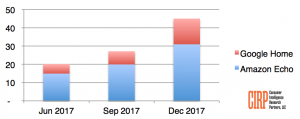What is Voice Search and Why Should you Care in 2018?
It seems a bit silly to define voice search, but we practice what we preach at Alphametic, so we’re going to optimize for voice search here and now:
“Voice search is a speech recognition technology that allows a user to speak a search query into a device.”
On the off chance Google rewards us an answer box snippet for that definition, this brings us to the WHY. Why do marketers, especially SEO’s, need to pay attention to when it comes to this here-to-stay trend? Let’s get started.
Voice Search Statistics
Here are some voice search statistics to visualize the current state of affairs:
1 in 6 Americans now own a Smart Speaker (Source: TechCrunch)
40% of adults now use voice search once per day (Source: Branded3)
By 2020, 50 percent of all searches will be voice searches.(Source: ComScore)
Google’s AI read over 2,865 romance novels in order to improve its conversational search abilities (Source: BuzzFeed News)
Voice commerce was a $1.8 billion retail segment in the U.S. in 2017 and $200 million in the U.K. (Source: Voicebot.ai)
20 percent of mobile queries are voice searches (Source: Google)
Mobile voice-related searches are 3X more likely to be local-based than text (Source: Search Engine Watch)
72% of people who own a voice-activated speaker say their devices are often used as part of their daily routine. (Source: Think With Google)
To view these statistics in graphic form, check out this post.
The world is undoubtedly (and quickly) adapting to voice search. It’s not a matter of whether you SHOULD adapt your SEO strategy to voice search, it’s HOW.
The good news is that after analyzing what all the experts are predicting and based on studies done by some very enterprising individuals, us SEO’s have got a good go-ahead strategy to tackle this juggernaut of a technological disruption.
And the best part, it’s mostly things we already SHOULD be doing. Take a look:
How Does Voice Search affect SEO?
-People Speak Differently Than They Type
According to Neil Patel in reference to voice search:
“No longer do you need to solely rely on using keywords inside your content a certain number of times. It’s all about natural language and the intended meaning behind the searcher’s query, rather than the query itself.”
Ever since Google’s Hummingbird update, semantic search has been an integral part of our search engine experience and is what made voice search possible. Whereas once we would’ve had to type in more exact phrases, such as “South America news 2017” to get this:
We can now type in the search query “What happened in South America in 2017” and it understands the inference – that we want to look at news coverage of important events, without having to type in the words, “news”, or “news sites”, or “newspaper” into the search box.
For a search engine, this once might have been a directionless query, but it now understands my intention of wanting to look at important news coverage it and so served me results of major news sites with articles specific to that region
Because of this more natural, conversational tone, it’s to the benefit of webmasters and SEO’s everywhere to take a look at the language on their sites and see if their main pages fulfill their user’s intent by communicating in easy to understand, natural language.
-Voice Search Will Give You One Answer, as Opposed to 8-10 Blue Links
Here’s the clincher. If you’re using a Google Home, or an Alexa echo, you’re only going to get one search result read back to you. There’s no ranking 2nd, 3rd or 4th. You must be the BEST result for that user’s command.
The interesting thing here is that according to a study done by Brian Dean from Backlinko:
“Content that ranks highly in desktop search is also very likely to appear as a voice search answer. In fact, approximately 75% of voice search results rank in the top 3 for that query.”
So, although screenless voice search only gives you 1 result, when it comes to the Google Home, it can potentially choose between the first 3 top results, not always THE top result.
This is important to understand since it paints a more realistic picture of what’s happening. Although there is an objective winner when it comes to Googles algorithm when not taking into account personalization, the reality is, Google ALWAYS takes into account location, past search history and other factors when serving you a result. So, although you may not be number 1 for a search query, you might still make it into an individual’s top results.
-There are 4 Main Intents With Voice Search (and Search in General)
Back in 2015, Google gave us some great insights into rising consumer search behaviors and coined them “micro-moments” in the online customer journey.
Essentially, these are 4 main intentions individuals have when searching online: when they want to know something, when they want to go somewhere, when they want to do something or when they want to buy something.
As a business, you should be particularly interested in the “I-want-to-buy-moments”, but all of these moments are opportunities to lead a user through the customer journey. In fact, searches on mobile with the word “best” have grown over 80% between 2015 and 2017. In other words, people searching “best restaurants in X city” or “best moisturizer for dry skin” for example, increased dramatically once users understood that Google had the capability to serve them accurate results.
With the rise of voice search, your SEO efforts should focus on these search behaviors and “micro-moments” that are deeply entrenched in consumer’s minds. And with that in mind, let’s dig a little deeper.
Next, we’ll discuss some practical SEO strategies to position yourself to be discovered through voice search where it makes sense for your business.
What SEO Strategies Can You Use to Rank on Voice Search?
-Find Opportunities to Rank for an Answer Box Snippet
This is something that most SEO’s are already doing, but it takes on a new dimension in voice search SEO. According to this study by Backlinko, 40.7% of voice search responses came from a Featured Snippet.
That feature typically gives a user a quick and simple answer to any query, so it makes sense that Google Home would be populating its answers from the algorithm for Featured Snippets.
-Tighten Up Your Local SEO
Google My Business is a huge source of information for people searching for local businesses. If you have your Google My Business listing fully optimized and up to date with current information, you’re giving it every chance to be an option on someone’s voice search results.
-Place Schema on Your Top Pages
Although schema doesn’t seem to have a large correlation between its use and being the answer to a Google voice search, the purpose of on-page schema is to give Google a better picture of what your page is supposed to represent.
Ths is especially crucial in the ecommerce space when Google search results can expose your brand to a new customer. It doesn’t hurt to help Google understand the purpose of your page more clearly.
-Optimize for the Long-Tail
As mentioned a bit earlier, individuals are using more natural language in their voice queries. This is a ripe opportunity for long-tail keywords with high search intent (and high commercial intent).
Let’s say you’re a company that sells French Press coffee machines. You have a great post on your blog that goes through the brewing times and temperatures for different coffee types that can be utilized for a great cup of Joe in your French Press. Someone interested in the French Press method of brewing is possibly searching for different brewing methods.
In the Google search bar you might type in “How to Brew French Press”
But on a voice search, you might say “How to Correctly Brew Coffee in a French Press”
This an opportunity for you to not only appear on results, but if the user if using a Google Home or Alexa and they’re not in front of a screen, you can optimize headlines for short answers to common questions that may be asked in a voice search.
-If You Haven’t Already, Optimize for Mobile
Not to beat a dead horse, but mobile optimization is key to everything. 20% of people conduct voice searches on mobile, so the more mobile-friendly your business is, the more opportunity to land on a voice search answer.
This means fast page speeds, responsive web designs, easy and simple UX, AMP pages, and of course, great content.
-DON’T FORGET BING
Yes, Bing. Many search marketers utilize PPC on Bing since it is the search engine with the 2nd largest market share in the U.S. But, the most relevant reason why Bing is important for Voice search SEO? – Alexa uses bing as her search engine.
The current top players in the world in the voice search market are Google Home and Amazon’s Alexa, with Alexa taking the lead by a landslide. Alexa has over 39 million units in circulation or 69% of the market. Google Home currently has 14 million units at 31% of the market.
This is one of the few areas where Bing has managed to one-up Google for years, so optimize for Bing and don’t forget it under the shadow of the Google behemoth.
-And Finally, Relax.
At the end of the day the concept is the same, ranking for targeted keywords and getting to the top of SERP’s. A lot of these strategies are already well-established best practices in SEO, so keep following best practices and make a few tweaks if it makes sense for your business. The landscape is competitive, but not impossible. Set your goals, track your progress and keep up the good work. I’ll leave with this great quote by Bradley Shaw:
“People are not afraid of the machine anymore, they have gone beyond a period of discomfort and hesitance and into a place of comfort and instantaneous gratification. When we consider the full scope of voice search, we eventually break it down to a consumer being able to gratify a search need without ever having to pull away from decorating the Christmas tree.
The question for online marketers has now become, “will my goods or services fill the need?”
For more SEO news and trends check out Recent Google Updates and SEO Trends for 2018
This post was originally published on the Alphametic Blog here.

Matthew Capala is the founder of Alphametic, an expert search engine marketing and optimization agency, and SearchDecoder SEO Training Institute. He is the author of “SEO Like I’m 5” and has spoken at hundreds of events all over the world. His work and ideas have been featured in Inc, Entrepreneur, Forbes, eMarketer, and the Chicago Tribune.











